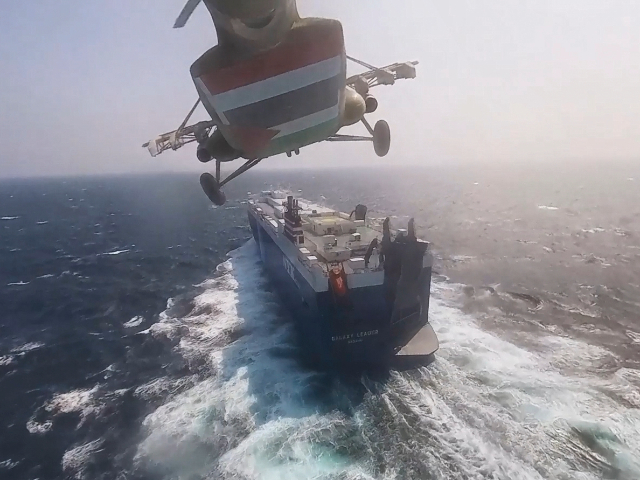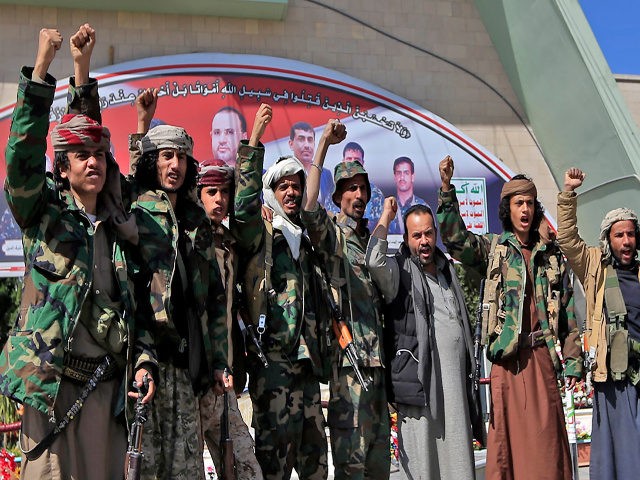The Iran-backed Houthi terrorist organization of Yemen vowed on Wednesday to continue launching attacks on international shipping vessels in the Red Sea – but insisted it would only target vessels linked to Israel and that “international navigation in the Red Sea and the Arabian Sea is safe.”
The Houthis, a Shiite jihadist organization that claims it is the formal government of Yemen after seizing power of the capital Sana’a in 2014, condemned the United States for allegedly “misleading” global shipping corporations into believing that Houthi attacks on their ships were possible.
In reality, the Houthis have attacked a variety of cargo vessels in the Bab el-Mandeb Strait, which ships use to enter the Red Sea and the Suez Canal, including many with at best distant ties to Israel or the United States. The Houthi group declared war on the nation of Israel in October in response to the Hamas atrocities against Israel that month, announcing a full-throated defense of the mass murder, gang rape, abduction, torture, and desecration of corpses committed by the ruling party of Gaza. Both Hamas and the Houthi group received financial backing from the Iranian Islamic regime.
The international shipping giant Maersk has suspended shipping through the Red Sea on two occasions, the latest an ongoing indefinite pause, following Houthi attacks on its ships. The latest attack targeted the container vessel Maersk Hangzhou, a Singapore-flagged ship on the way to Egypt with no overt ties to Israel.
Following the Maersk decision to suspend trade through the Red Sea, a significant number of shipping companies followed suit, rerouting their ships around the Cape of Good Hope in Africa.
The far longer and more expensive route has seen a massive increase in traffic as a result of the Houthi attacks, while container ship traffic through the Red Sea and Suez Canal fell 90 percent year-on-year for the first week of January, according to the Financial Times.
Houthi leaders absolved themselves of any responsibility for the tremendous disruption in international commerce on Wednesday, instead blaming American military efforts to protect shipping from Houthi attacks. They also insisted that their attacks on ships in the region would continue.
“We reiterate that the (Yemeni) Armed Forces will continue to target Israeli-linked ships or those heading to the ports of occupied Palestine until the aggression stops and the siege on Gaza is lifted,” Houthi spokesman Mohammed Abdul Salam said, according to Iran’s regime-linked Tasnim News Agency.

This photo released by the Houthi Media Center shows a Houthi forces helicopter approaching the cargo ship Galaxy Leader on Sunday, Nov. 19, 2023. (Houthi Media Center via AP)
In the same statement, Salam insisted, “international navigation in the Red Sea and the Arabian Sea is safe, and Americans must stop misleading the world about dangers threatening international navigation in these seas.”
“We urge all countries to be cautious of falling into America’s trap aimed at militarizing the Red Sea in service of Israel and to encourage it to continue its brutal aggression on the Gaza Strip,” he added.
Salam’s remarks followed what American and British officials described as “the largest attack from the Iranian-backed Houthis in the Red Sea to date” on Tuesday, in which Western forces said the terrorist organization launched 18 suicide drones, two anti-ship cruise missiles, and a ballistic missile at ships attempting to travel through the route. A joint effort by the U.S. and British navies took down all of the drones and missiles, the nations announced.
Brigadier General Yahya Saree, a Houthi terror spokesman, claimed on Tuesday that the American and British militaries posed a direct threat to the Yemeni “homeland” and the Houthis had acted in self-defense.
“Yemeni forces will not hesitate to exercise the legitimate right to defend their homeland and nation, and proportionally respond to all potential threats and hostile moves,” he said, according to Iranian propaganda outlet PressTV.
According to Saree, ten Houthi terrorists were killed in the exchange, during which he said the Houthis were “performing their humanitarian and moral duty … to prevent Israeli ships or those heading to the ports of occupied Palestine from passing through the Red Sea” as well as “establishing security and stability and protecting maritime navigation.”
American operations in the Red Sea are part of “Operation Prosperity Guardian,” a Pentagon-organized coalition of countries sending naval assets to the region to protect shipping.
The United States has failed to involve several major players in “Operation Prosperity Guardian,” including Israel and neighboring allies such as Saudi Arabia, as well as India, which announced its own independent naval deployment on Wednesday to protect its shipping from piracy generally.
RELATED: Pentagon — ‘No Indications’ Houthis Will Stop Attacking
The Houthis are a jihadist terrorist organization that overthrew the legitimate government of Yemen and plunged the country into a civil war in 2014. Their official slogan is “Allahu Akbar, Death to America, Death to Israel, Curse on the Jews, Victory to Islam.”
The Houthis were a U.S.-designated terrorist organization until February 2021, when then-newly inaugurated President Joe Biden’s State Department delisted them, baffling the free world. Secretary of State Antony Blinken insisted at the time that delisting the Houthis was necessary to allow humanitarian aid into the starving, plague-stricken country, but conceded that the group did not abandon terrorist activities and thus did not merit removal. The Houthis proceeded to immediately block humanitarian aid following the delisting and subsequent shipments of food and medicine.
The Biden Treasury Department announced targeted sanctions against a small number of individuals in December in response to the Houthis’ Red Sea attacks but has refused to restore the Houthis to the State Department list of Foreign Terrorist Organizations at press time.
Follow Frances Martel on Facebook and Twitter.

COMMENTS
Please let us know if you're having issues with commenting.